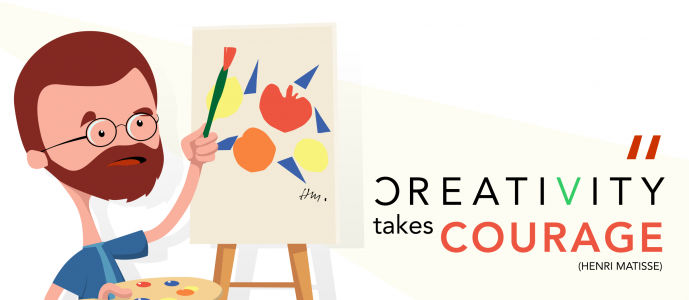Creativity is the Power Skill that Drives Organizational Value

Not long ago, business was a pursuit for those with a knack for analytics, leadership, and persuasion. However, recent changes in how people engage with businesses have disrupted the traditional marketing and sales dynamic. Thus, businesses can no longer compete on product and price point alone.
Creativity is now a must-have asset for every growing enterprise. And yet, most businesses are falling short in their creative capacities.
According to a 2016 survey of advertising and marketing agencies, 58 percent of respondents stated finding creative professionals was challenging.
“Creative people can take seemingly disparate data sets and make meaning from them to help businesses make better decisions and develop smarter strategies.”
If these types of agencies — typically a huge draw for creatives — are having trouble filling their ranks, other businesses are likely struggling to fill creative roles as well.
Rather than searching for external creative experts, organizations can evolve their culture to unlock the creative potential inside every employee.
To differentiate themselves from competitors, businesses need creativity to permeate every corner of their culture. From the sales department to the C-suite, here’s why creativity is on the rise.
Creative Companies Are More Profitable
According to an Adobe/Forrester Research study reported on by the Daniels College of Business at the University of Denver, companies that encourage a creative culture are 3.5 times more likely to achieve 10 percent revenue growth goals.
Additionally, they remain 50 percent more likely to report a commanding market leadership position over competitors.
Creativity is what leads to big, innovative ideas that disrupt entire industries. Therefore, businesses that foster a creative and collaborative culture are more likely to produce these value-driving ideas.
Creative People Can Make Connections Others Can’t
With so much emphasis on data, one would think that data itself is the key driver of business success.
But it’s the connections within the data that are the true prize.
Data tells a story. Creative people can take seemingly disparate data sets and make meaning from them to help businesses make better decisions and develop smarter strategies.
Granted, the business landscape changes rapidly, and the most effective strategies must adapt in real-time. Once a strategic framework is crafted by a team or an organization, a creative mind is more apt to pivot and adjust as new information is gathered and evaluated.
Thus, creativity spurs the important power skill of adaptability. Adaptability represents a key component of the Agile methodology, which drives strategic value when converged with a Business Relationship Management (BRM) capability.
Demand for Creative Talent Will Only Rise
Skills like empathy and storytelling are no longer the sole purview of Humanities departments at universities. Now, more than ever, businesses need soft skills like problem solving and communication. Moreover, businesses require creative skills like idea origination and divergent thinking.
According to a report by the World Economic Forum, the top three skills professionals will need to succeed in 2020 are:
- Complex problem-solving
- Critical thinking
- Creativity
Beyond hiring for these skills, businesses need to develop and nurture them in-house.
Logically, creatives aren’t just interested in chasing high salaries or acquiring great job benefits. They’re looking for opportunities to grow and challenge themselves. They’re looking for purpose.
Businesses that fail to provide employees with the right creative environment for professional development risk losing them to firms that do.
Hone These Skills to Better Serve Others
Today’s business partners are now accustomed to personalized experiences that make their value-contribution journey seamless and convenient.
Whether you’re hiring a sole contributor in the Marketing department or a senior director of HR, building these experiences requires the prioritization of new skill sets, such as empathy, creativity, and imagination.
Join BRM Explorers for free to stay informed about the growing creative business landscape and latest BRM trends. You’ll become part of a group of leading business executive professionals from around the world.
You’ll also stay up to date on upcoming events and receive the bi-weekly newsletter, BRM News, with the latest knowledge on Creative content.
